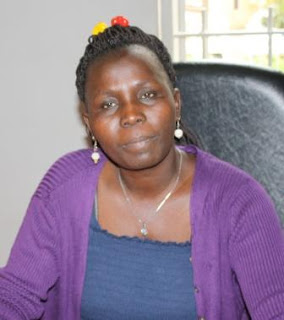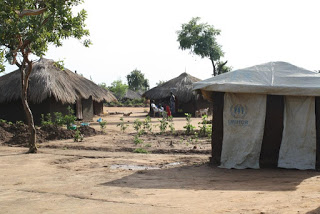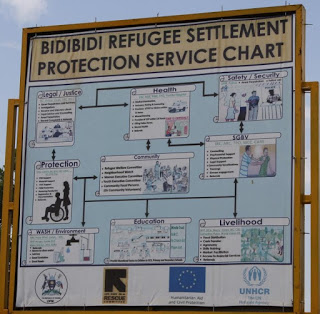UGANDA: Journeying together with the Refugees, Caritas Uganda’s interventions at Bidibidi Refugees Settlement Camp

Laura Christine Okello, Caritas Uganda Program Officer
According to the UNHCR Uganda Factsheet of July 2017, approximately 716,732 South Sudanese have arrived in Uganda since 8 July 2016. Out of these 272,206 settled in Bidibidi, 174,469 settled in Palorinya while 123,019 settled in Imvepi. According to the same fact sheet, a total of 1,326,750 refugees and asylum-seekers, including 164,282 awaited the biometric registration by end of July 2017.
Caritas Uganda started emergency response in the refugees settlement together with Caritas Arua Diocese in 2016 when the refugees were just coming in. They began by implementing the emergency response in phases.

a toilet/bathroom and a mall kitchen garden
“We implemented livelihood and food security project under this phase. So during the first phase, we distributed non-food items such as mosquito nets, sanitary towels to adolescent girls; then we distributed fast-growing vegetable seeds such as tomatoes, eggplants and okra, among others. Around the same time, the World Food Program, WFP, was distributing seeds for maize, sorghum and others. We as Caritas wanted to improve the nutrition of the new arrival refugees therefore the decision to distribute the fast-growing vegetable seeds,” explained Laura Christine Okello, Program Coordinator at Caritas Uganda.
That project which ended in September 2017 was launched by Caritas Internationalis on behalf of Caritas Uganda and, according to Laura, it was very successful. The second phase of emergency response was sponsored by Caritas Norway and Caritas Denmark.
“After the emergency interventions, we realized that we needed to consider food security crops taking into account the ongoing needs of the refugees according to the pillars of Comprehensive Refugee Response Framework. Under the Caritas Denmark Project, we take students from the settlements to vocational skills training centres,” Laura explained, adding that they take them to Lodonga Vocational School – a Catholic-run institution which is approximately 29.8 kilometres away from the camp; and Lokopio – a government-run institution which is about 12.9 kilometres from Bidibidi.
Caritas Uganda usually advertises the opportunities and encourages the refugees as well as the hosting community’s members – the majority of whom are equally poor – to apply for courses of their choice. Unfortunately, many young women don’t respond owing to the fact that the standard requirement for enrolment is an equivalent of a primary school leaving certificate, P7, which most of the female refugee that apply do not have and therefore they are technically disqualified.
“Because of this setback, we had to devise a Plan B, and this meant considering community based skills training so that even those who have not completed P7 can get trained in courses such as tailoring, making soaps and other skills training.”
Another challenge with the vocational skills training program which Caritas Uganda encounters has been the fact that some applicants who qualify for the trainings are primary caregivers of small children. Since the vocational skills training centres require that the trainees remain at the institution for the period of the training, it is difficult for these people to leave their children home.
“We are therefore negotiating with donor partners on how we can have a budget line for baby sitters and for other necessary and related costs. This means that the costs of the project will certainly go up. In the meantime, this challenge is knocking out many potential beneficiaries from the program,” Laura said, adding that some trainings run for six months upon which the participants sit for Government examinations and are at the end given certificates; other trainings run for only three months and at the end the trainees are awarded certificates.
The community based skills training, on the other hand, run for 1 to 3 months depending on the nature of the course. Upon successful completion, the trainees are usually provided with a start-up kit relevant to what they have studied.
Another major setback to the vocational skills training is the increase in the cost of training students, which has since doubled from last year. Previously one student would be trained at approximately USD 240 but now the
cost has risen to approximately USD 340; this makes the vocational skills training no longer cost effective. Caritas Uganda is considering a strategic plan B, of going only for community based training where they can manage to support more students.

organizations to the Refugees at Bidibidi Settlement
Bidibidi has five zones and, according to Laura, there are many NGOs doing different activities. Under Livelihood Program, the activities include Food Distribution, Cash Transfer, Agronomy, skills training, market facilitation, Access to Financial Services and Referrals. NGOs involved in Livelihood Programs include the WFP, DanChurchAid, Mercy Corp, Catholic Relief Services (CRS) with whom Caritas Uganda share an office at the Camp, Samaritan Purse and World Vision International (WVI).
“We are based in Zone II of Bidibidi Settlement, and Zone II has eleven villages (blocks). Our partners from Caritas Belgium are in Zone I of Bidibidi and CRS are in Zone IV annex. Most of our partners are implementing projects on Livelihood but CRS is also implementing projects in Water, Sanitation and Hygiene (WASH), and they are also responsible for shelter-like construction of houses for the training centres among others,” Laura explained, adding that the agreement between partners working in the same zone is that there is no duplication of services.
After this second phase, Caritas Uganda intend to shift to sustainability issues, which is in line with the pillars of comprehensive refugee response plan. “In 2020, we want to see to it that if the people we are currently supporting go back to their home country in Sudan, they can they stand on their own, and that they can engage in some income generating activities to support themselves and their families,” she said.
∽End∽


